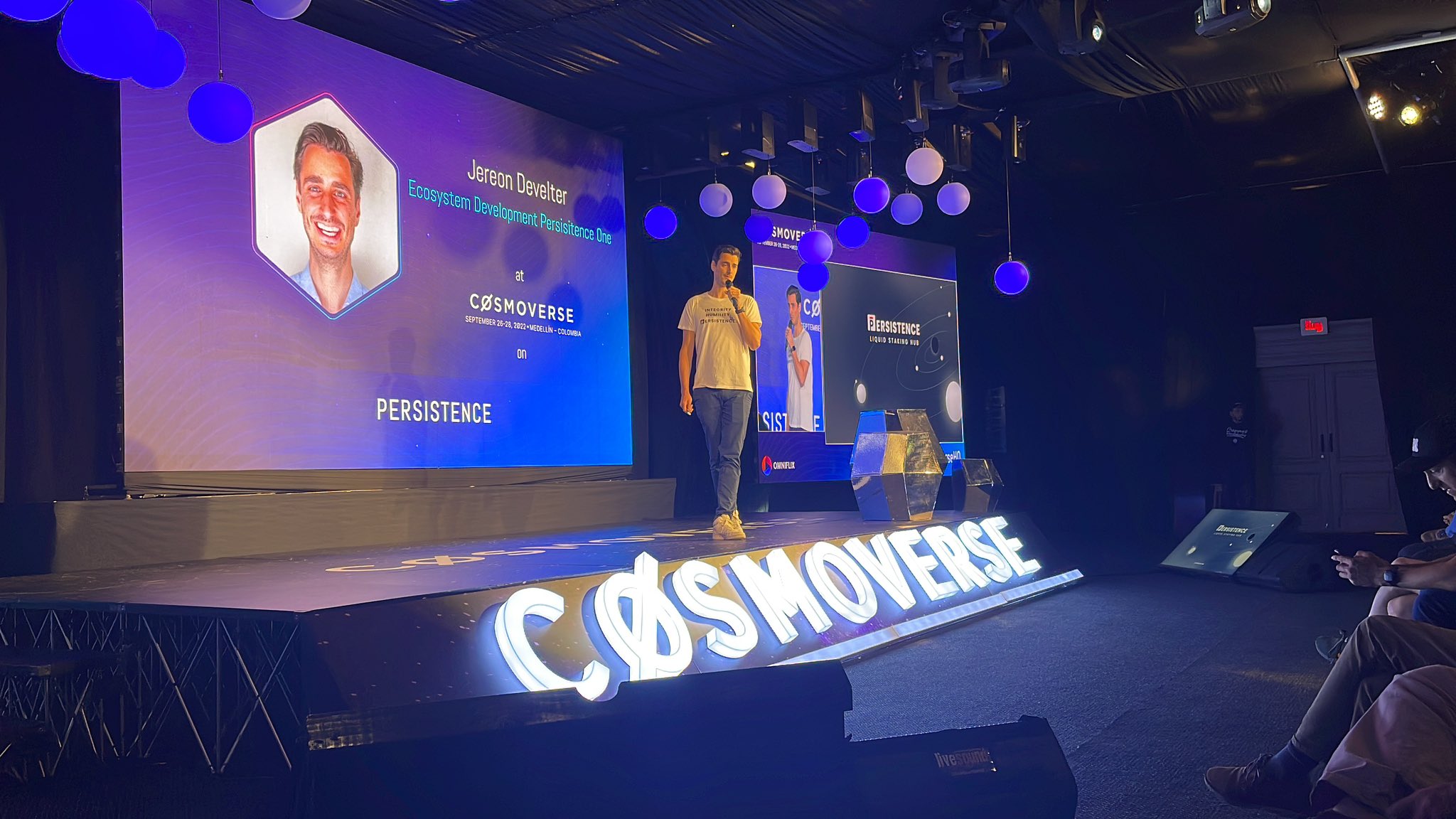Cosmoverse Day 2 Saw a Deep Dive Into Liquid Staking on Cosmos, the Value of Privacy in Web3, and How to Bring More Users Into NFT Gaming
Disclaimer: The text below is a press release that is not part of Cryptonews.com editorial content.
Joe Bowman, Co-Founder of Quicksilver kicked off the morning walking through what’s at stake without liquid staking. He referenced the loss of ability to unlock liquidity and less capital efficiency. With staking, users are free to tokenize assets off-chain and stake the rewards.
Joe teased an upcoming project announcement as well, “We’re able to better secure the network for better capital on the networks instead of being held at liquid, waiting for users to use at DeFi. Governance by proxy is such a prominent feature of Quicksilver and will hopefully be on the Mainnet soon.”
Joe also discussed the sovereignty of the delegators, especially not dictating how locked capital is distributed and allowing delegators to dictate voting power.

Jereon Develter, Ecosystem Development at Persistence One, discussed how the platform was built through the early days of Cosmos, which looks very different from what it does today.
Speaking about how Persistence One brought interchain liquid staking to Cosmos through Ethereum he explained how they didn’t want to “use patience as an excuse not the experiment with things.”
The team has announced the upcoming launch of staked assets including stkATOM and stkXPRT to the Cosmos ecosystem and multiple partnerships that aim to further expand its liquid staking hub.
Kai Tiurin and Sergey Ratiashvili, Core Contributor and Developer of Lido respectively, discussed all things Lido on Cosmos – from the current pain points of vanilla staking distribution to the future of interchain liquid staking in this renewed Cosmos ecosystem.
Kai and Sergey assessed the different flavors of liquid staking, unpacking the difference between permissionless and curated validator sets, emphasizing that “blended sets combined the benefits of both approaches”.
The team finished by introducing Neutron, a smart contract platform secured by Cosmos Hub.

Zaki Manian, Co-Founder of Sommelier Finance moderated a panel about DeFi on Cosmos with Vishal Talasani, Co-Founder of Stride, Mikhil Pandey, Lead of pSTAKE Finance, Sunny Aggarwal, Co-Founder of Osmosis, and Hyung Yeon Lee, Co-Founder of Crescent.
When discussing the barriers to building the desired DeFi experience in Cosmos, Hyung Yeon claims that the asynchronous nature of the interchain wall is what prevents us from building a connected economy. As a potential solution, he proposes a collaboration among different blockchains to create this “multi-chain block, a single block connected to each other where IBC can be expanded as a feature”.

Gregory Landua, Co-Founder of Regen Network highlighted how they’re working towards making an interchain world possible. But, the unexpected problem is how quickly the Climate CFarmers Soil Carbo Credits are selling out before hitting the marketplace. Their solution is to create onward forward agreements and ex-anti-credit classes to assure liquidity.
“It’s cool because native credits will create the full market efficiency and build a bridge and move assets over to unstrain the assets and regain equilibrium to an appropriately priced asset.”

Tor Blair, Co-Founder of Secret Foundation spoke about the fight for web3 privacy. Tor spoke on the importance of decentralization and adoption of privacy for users, to be sustainable and empowering, and how Secret Network, a privacy hub, would solve the problem for all blockchains.
“We need pragmatic solutions that can solve problems today, that push forward privacy for the entire web3 space, that protects us in the web2 world, that provide a meaningful alternative for users – that they can start using and understanding.”
Tom Norwood, Co-Founder of Loop Finance, discussed building web3 communities through the different functionalities of NFTs. Tom claims that “NFTs are perfect for building communities” due to the many different types of NFTs that can be leveraged to increase engagement, and profitability, and foster a symbiotic relationship between protocols and their community.

Moderator Cigdem Oztabak of CNNTurk guided Lukas Unterschültz, Co-Founder of Kelepar, Luis Londoño Noreña, Manager of WEB 3.0 developments at Monastery, and Carlos Guzman, a researcher from The Block through a discussion on Gaming on Cosmos.
Lukas explained he prefers blockchain gaming or NFT gaming over play-to-earn. “I think we need to get into the gaming community and out of the crypto community.”
The biggest pain point, identified by Carlos, was the lack of focus on the user experience. “Right now crypto functionality causes friction for gamers. They don’t want to have to go to an exchange and buy a token, download a wallet, etc. to play a crypto game. I think that turns off most game users. As long as blockchain functionalities are front and center, I think crypto games will have a tough time entering the market.”
Luis, who created one of the first NFT projects in Colombia called Monastery and mentioned, “The idea is to build a community around it. I think NFTs are the next step.”
– ANNOUNCEMENTS AND INDUSTRY DEVELOPMENTS –
Comdex, the DeFi infrastructure layer for the Cosmos ecosystem, launches a series of testnets to bring sustainable DeFi to the Cosmos ecosystem. The testnets of products allow for a few upcoming features including the $HARBOR airdrop to several communities, Bug Bounty Program, and the Mainnet launch of our dApps.
Disclaimer: The text above is an advertorial article that is not part of Cryptonews.com editorial content.


